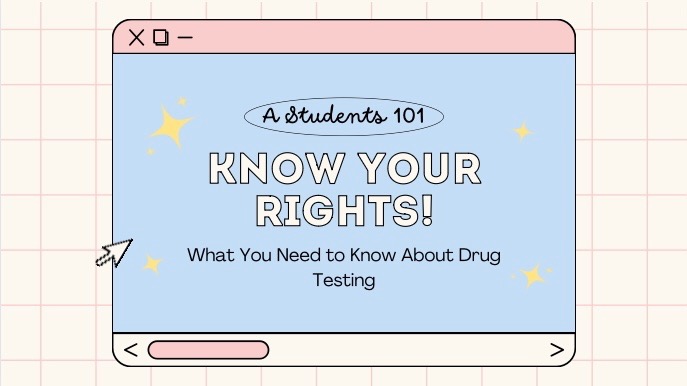Can schools require drug testing?
March 13, 2023
With prom quickly approaching, a particular policy was implemented for the 2022 Homecoming Dance: one that involved randomly drug testing students to see if they were under the influence of drugs.
According to an email sent to students by Tigard High Administration in October; “For student safety, a breathalyzer will be in use at the dance.” When the student body had initially found out, they felt particularly threatened, considering the random sampling which was being established.
In an anonymous interview, a student mentioned, “I thought it was a bit ridiculous that they felt the need to threaten students.”
Although drug testing policies are unclear for the general student body, and not mentioned in the student handbook or the district’s website, Oregon legislation, and local court rulings have provided some structure and safety for students. All students have the right to say no to a random drug test unless there is “reasonable suspicion” for conducting the test.
According to the national branch of the American Civil Liberties Union (ACLU), “In order for a school to implement a drug testing policy, there must usually be reasonable suspicion that you, as an individual, are using drugs.”
Students also have the right to contact an attorney if they feel there wasn’t grounds for reasonable suspicion or there was an ulterior motive behind testing. However, for those who do decide to refuse a drug test, silence should not be a sign of self-incrimination under the 5th amendment. When talking to the administration, additional comments around your behavior can be used as criminalizing evidence, so choosing what you decide to reveal is important. Even after refusal, there is still a possibility that you will have to comply with a drug test; however, you do have the initial rights of refusal and the right to remain silent.
According to Albeit Walker, LLP, reasonable suspicion for drug testing can include, the scent of alcohol on a student’s breath, a student being visibly impaired, or learning from a credible source about a student’s drug use. The behavior of a student’s impairment can be unusual speech or actions. However, a student’s behavior does not justify a drug test if there are no other clear indicators of drug use.
The laws around reasonable suspicion differ for student athletes and those participating in extracurricular activities. In the famous case of Vernonia School District v. Acton (1995), a high school football player refused a random drug urinalysis, and his parents filed a lawsuit saying suspicionless drug testing was unconstitutional under the 4th Amendment. School officials were concerned that drug use increases the risk of sports-related injury.
The Vernonia School District created the initial policy which was then adopted the Student Athlete Drug Policy which authorizes random urinalysis drug testing of its student athletes. The Supreme Court ruled 6-3 in favor of the Vernonia School Districts policies in order to continue random and suspicionless drug testing for student athletes.
In 2002, this policy was once again challenged and the Court of Appeals found certain aspects of random urinalysis samplings unconstitutional and stated, “random urinalysis did not constitute an unreasonable administrative search, but that requiring students to disclose prescription medication use prior to testing was unreasonable – disclosure of prescription medication use to explain a positive test result was, however, valid,” (Weber v. Oakridge School District, 2002).
The laws around suspicionless drug testing have been recently challenged in many states, and many student activists and health organizations have begun organizing around these particular issues.
One of the main reasons why suspicionless drug tests were implemented was in hopes to lower the number of students that were engaging in illicit drug use. However, recent studies done by the U.S. Department of Education’s Office of Safe and Drug-Free Schools gave funding to implement random drug testing programs to 36 high schools, under the study called “The Effectiveness of Mandatory-Random Student Drug Testing.” Contrary to the initial hypothesis, however, students were not particularly deterred from drug use with the threat of randomized drug testing, and randomized drug testing was also linked to widening the school-to-prison pipeline, disproportionately impacting students of color.
One of the successful examples where students won the right to privacy, was in Tannahill v. Lockney (2001) where the American Civil Liberties Union and the Lockney Independent School District came into a heated battle over the suspicionless drug-testing policies for those in grades 7-12. After careful judicial review, the procedure was dropped and deemed unconstitutional.
The conversation of students’ rights over drug testing policies continues; however, it is crucial for students to understand their own right to privacy regarding drug testing policies.
If there is ever a moment where you feel like you are being unfairly targeted, you always have the right to refuse.










